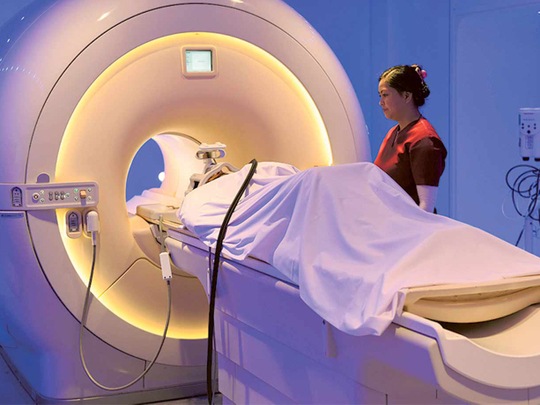
Abu Dhabi: Although 15 per cent of cancers are inherited, many can actually be prevented with real lifestyle changes, a leading oncologist in the capital said.
The UAE records cancer as one of its top killers, with 4,500 new cases reported daily. In the emirate of Abu Dhabi, 1,729 new cases were detected in 2012 alone, with 28 per cent among Emiratis and 72 per cent among expatriate residents. This made cancer the third leading cause of death in Abu Dhabi, accounting for 13 per cent of all fatalities.
“The good news is that key lifestyle changes are effective in greatly reducing cancer risk,” said Dr Mohannad Diab, consultant medical oncologist at NMC Speciality Hospital in Abu Dhabi.
The doctor explained that the term ‘cancer’ refers to a large group of over 200 diseases that are characterised by uncontrolled growth and spread of abnormal cells. Unlike healthy cells, these do not self-destruct when they become worn out or damaged, and they tend to crowd out normal cells.
A combination of lifestyle, environmental and genetic factors contribute to cancer development.
“We may not be able to change genetic risks, but we can avoid unhealthy habits like smoking, uncontrolled diets rich in fat and low in fibre, and sedentary lifestyles. All of these are known risk factors for obesity and cancer,” Dr Diab said.
In Abu Dhabi, breast cancer is the most fatal cancer, followed by cancers of the lung, liver, blood, colon and rectum.
Fortunately, breast cancer can be detected quite early if women undergo yearly mammograms after 40 years of age, and clinical breast exams every three years for younger women. Similarly, possible growths that can turn into colorectal cancer can also be detected with faecal tests or colonoscopies in people 50 years or older.
To check for possible cervical cancer in women, pap smears can be used while prostate cancer can be detected through digital rectal exams or blood tests.
“In those who have a family history of cancers, these screenings should be started earlier and could be conducted more frequently,” Dr Diab recommended. He added that the five-year survival rate for cancer patients is also on the rise.
“Between 1913 and 2003, the rate increased from 10 per cent to 66 per cent. And advances in medical research are set to continue as we fight cancer,” Dr Diab said.
Recommendations
Screening is the process of looking for cancer in people who have no symptoms of the disease. Regular screening for some types of cancer can detect changes in cells before they become cancerous, or allow cancers in their early stages to be cured.
While certain recommendations are issued by health regulators and governing bodies, the frequency of screenings could be increased for those who have a family history of cancer and those who have already suffered from cancer in the past.
Health Authority Abu Dhabi recommends
Breast cancer: Mammograms every two years in women aged 40 and above
Cervical cancer: Pap tests every three to five years for women aged 25 to 65
Colorectal cancer: Colonoscopy every ten years or stool test every two years for those between 40 and 75 years of age
American Cancer Society additionally recommends
Lung cancer: Low-dose CAT scan of the chest for those aged between 55 and 74 and who have smoked a pack of cigarettes a day for 30 years or two packs a day for 15 years
Prostate cancer: Men aged 50 and older should talk to a physician about screening (blood test and possible rectal exam) and whether it is advisable in their individual case
Fighting cancer through food
While there is much talk of miracle foods, not all have been proven to eliminate or even reduce cancer risk. Still, eating a healthy, balanced diet helps protect against obesity, which itself heightens cancer risk.
In fact, cancer rates could decline by up to 20 per cent if everyone consumed five servings of fruit and vegetables per day, said Dr Mohannad Diab, consultant medical oncologist at NMC Speciality Hospital in Abu Dhabi.
“Eat more high-fibre foods like wholegrain, cereals, beans, and vegetables, while cutting back on high-fat foods like butter, margarine, fried foods and rich desserts,” he added.
Dr Aladdin Maarraoui, consultant and chief of haematology and oncology at Abu Dhabi’s Mafraq Hospital, said that some foods, when eaten regularly as part of a balanced diet, have shown properties of fighting cancerous cells, but that there are a lot of myths as well. In addition, mixing beneficial foods can reduce their cancer-fighting properties:
Good foods
Coffee: Can have protective effects, if not coupled with smoking, against endometrial, liver, some forms of breast, prostate, liver and skin cancer
Green tea: Beneficial and protects against breast, lung and stomach cancers
Pomegranate: Its anthocyanin red pigment protects against prostate cancer and breast cancer, and can even slow the progress of cancer.
Black seed: Very good at fighting cancer, and even enhances the effect of chemotherapy.
Saffron: Helps fight several types of cancer, including leukaemia.
Garlic: Reduces helicobacter pylori, a bacteria in the stomach that is related to some forms of stomach cancers.
Bad foods
Red meat: Limit consumption to 80 grams per day on average and avoid burning or barbecuing meat.
Soft drinks: 4-MEI, a brown colouring in many soft drinks, is known to be carcinogenic.
World Cancer Day
Cancer is the one of the leading killers across the world, leading to more than 8 million fatalities each year. Of these, 4 million pertain to premature death of individuals between the ages of 30 and 69.
In the UAE, the prevalence of cancer has more than doubled during the past 10 years, and health officials said last year that a specific rise is expected in the region by 2020. At present, about 4,500 new cases are reported daily, said Dr Mohannad Diab, consultant medical oncologist at NMC Speciality Hospital in Abu Dhabi.
World Cancer Day is marked annually on February 4 to raise awareness about cancer.












